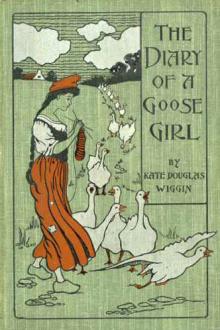The Arabian Nights - - (inspirational books to read txt) 📗

- Author: -
- Performer: -
Book online «The Arabian Nights - - (inspirational books to read txt) 📗». Author -
The Project Gutenberg EBook of The Arabian Nights, by Unknown
This eBook is for the use of anyone anywhere at no cost and with
almost no restrictions whatsoever. You may copy it, give it away or
re-use it under the terms of the Project Gutenberg License included
with this eBook or online at www.gutenberg.org
Title: The Arabian Nights
Their Best-known Tales
Author: Unknown
Editor: Kate Douglas Wiggin
Nora A. Smith
Illustrator: Maxfield Parrish
Release Date: March 27, 2007 [EBook #20916]
Language: English
*** START OF THIS PROJECT GUTENBERG EBOOK THE ARABIAN NIGHTS ***
Produced by Irma pehar, Graeme Mackreth, and the Online
Distributed Proofreading Team at http://www.pgdp.net
cover
THE ARABIAN NIGHTStitle page
Copyright, 1909, by
Charles Scribner's Sons
Published October, 1909
verso
PREFACELittle excuse is needed, perhaps, for any fresh selection from the famous "Tales of a Thousand and One Nights," provided it be representative enough, and worthy enough, to enlist a new army of youthful readers. Of the two hundred and sixty-four bewildering, unparalleled stories, the true lover can hardly spare one, yet there must always be favourites, even among these. We have chosen some of the most delightful, in our opinion; some, too, that chanced to appeal particularly to the genius of the artist. If, enticed by our choice and the beauty of the pictures, we manage to attract a few thousand more true lovers to the fountain-book, we shall have served our humble turn. The only real danger lies in neglecting it, in rearing a child who does not know it and has never fallen under its spell.
You remember Maimoune, in the story of Prince Camaralzaman, and what she said to Danhasch, the genie who had just arrived from the farthest limits of China? "Be sure thou tellest me nothing but what is true or I shall clip thy wings!" This is what the modern child sometimes says to the genies of literature, and his own wings are too often clipped in consequence.
"The Empire of the Fairies is no more.
Reason has banished them from ev'ry shore;
Steam has outstripped their dragons and their cars,
Gas has eclipsed their glow-worms and their stars."
Édouard Laboulaye says in his introduction to Nouveaux Contes Bleus: "Mothers who love your children, do not set them too soon to the study of history; let them dream while they are young. Do not close the soul to the first breath of poetry. Nothing affrights me so much as the reasonable, practical child who believes in nothing that he cannot touch. These sages of ten years are, at twenty, dullards, or what is still worse, egoists."
When a child has once read of Prince Agib, of Gulnare or Periezade, Sinbad or Codadad, in this or any other volume of its kind, the magic will have been instilled into the blood, for the Oriental flavour in the Arab tales is like nothing so much as magic. True enough they are a vast storehouse of information concerning the manners and the customs, the spirit and the life of the Moslem East (and the youthful reader does not have to study Lane's learned foot-notes to imbibe all this), but beyond and above the knowledge of history and geography thus gained, there comes something finer and subtler as well as something more vital. The scene is Indian, Egyptian, Arabian, Persian; but Bagdad and Balsora, Grand Cairo, the silver Tigris, and the blooming gardens of Damascus, though they can be found indeed on the map, live much more truly in that enchanted realm that rises o'er "the foam of perilous seas in faery lands forlorn." What craft can sail those perilous seas like the book that has been called a great three-decker to carry tired people to Islands of the Blest? "The immortal fragment," says Sir Richard Burton, who perhaps knew the Arabian Nights as did no other European, "will never be superseded in the infallible judgment of childhood. The marvellous imaginativeness of the Tales produces an insensible brightness of mind and an increase of fancy-power, making one dream that behind them lies the new and unseen, the strange and unexpected—in fact, all the glamour of the unknown."
It would be a delightful task to any boy or girl to begin at the beginning and read the first English version of these famous stories, made from the collection of M. Galland, Professor of Arabic in the Royal College of Paris. The fact that they had passed from Arabic into French and from French into English did not prevent their instantaneous popularity. This was in 1704 or thereabouts, and the world was not so busy as it is nowadays, or young men would not have gathered in the middle of the night under M. Galland's window and cried: "O vous, qui savez de si jolis contes, et qui les racontez si bien, racontez nous en un!"
You can also read them in Scott's edition or in Lane's (both of which, but chiefly the former, we have used as the foundation of our text), while your elders—philologists or Orientalists—are studying the complete versions of John Payne or Sir Richard Burton. You may leave the wiseacres to wonder which were told in China or India, Arabia or Persia, and whether the first manuscript dates back to 1450 or earlier.
We, like many other editors, have shortened the stories here and there, omitting some of the tedious repetitions that crept in from time to time when Arabian story-tellers were adding to the text to suit their purposes.
Mr. Andrew Lang says amusingly that he has left out of his special versions "all the pieces that are suitable only for Arabs and old gentlemen," and we have done the same; but we have taken no undue liberties. We have removed no genies nor magicians, however terrible; have cut out no base deed of Vizier nor noble deed of Sultan; have diminished the size of no roc's egg, nor omitted any single allusion to the great and only Haroun Al-raschid, Caliph of Bagdad, Commander of the Faithful, who must have been a great inspirer of good stories.
Enter into this "treasure house of pleasant things," then, and make yourself at home in the golden palaces, the gem-studded caves, the bewildering gardens. Sit by its mysterious fountains, hear the plash of its gleaming cascades, unearth its magic lamps and talismans, behold its ensorcelled princes and princesses.
Nowhere in the whole realm of literature will you find such a Marvel, such a Wonder, such a Nonesuch of a book; nowhere will you find impossibilities so real and so convincing; nowhere but in what Henley calls:
"... that blessed brief
Of what is gallantest and best
In all the full-shelved Libraries of Romance.
The Book of rocs,
Sandalwood, ivory, turbans, ambergris,
Cream-tarts, and lettered apes, and Calenders,
And ghouls, and genies—O so huge
They might have overed the tall Minster Tower,
Hands down, as schoolboys take a post;
In truth the Book of Camaralzaman,
Schemselnihar and Sinbad, Scheherezade
The peerless, Bedreddin, Badroulbadour,
Cairo and Serendib and Candahar,
And Caspian, and the dim, terrific bulk—
Ice-ribbed, fiend-visited, isled in spells and storms—
Of Kaf ... That centre of miracles
The sole, unparalleled Arabian Nights."
Kate Douglas Wiggin.
August, 1909.
CONTENTSThe Talking Bird, the Singing Tree, and the Golden Water
The Story of the Fisherman and the Genie
The History of the Young King of the Black Isles
The Story of Gulnare of the Sea
The Story of Aladdin; or, the Wonderful Lamp
The Story of Prince Agib
The Story of the City of Brass
The Story of Ali Baba and the Forty Thieves
The History of Codadad and His Brothers
The Story of Sinbad the Voyager
BY MAXFIELD PARRISH
The Talking Bird
It will be sufficient to break off a branch and carry it to plant in your garden
The Fisherman and the Genie
The smoke ascended to the clouds, and extending itself along the sea and upon the shore formed a great mist
The Young King of the Black Isles
When he came to this part of his narrative the young king could not restrain his tears
Gulnare of the Sea
And she proceeded to burn perfume and repeat spells until the sea foamed and was agitated
Aladdin
At the same time the earth, trembling, opened just before the magician, and uncovered a stone, laid horizontally, with a brass ring fixed into the middle
Prince Agib
And when the boat came to me I found in it a man of brass, with a tablet of lead upon his breast, engraven with names and talismans
Prince Agib
At the approach of evening I opened the first closet and, entering it, found a mansion like paradise
The City of Brass
And when they had ascended that mountain they saw a city than which eyes had not beheld any greater
The Story of Ali Baba and the Forty Thieves
Cassim ... was so alarmed at the danger he was in that the more he endeavoured to remember the word Sesame the more his memory was confounded
The History of Codadad and His Brothers
As it drew near we saw ten or twelve armed pirates appear on the deck
Second Voyage of Sinbad
The spot where she left me was encompassed on all sides by mountains that seemed to reach above the clouds, and so steep that there was no possibility of getting out of the valley
Third Voyage of Sinbad
Having finished his repast, he returned to his porch, where he lay and fell asleep, snoring louder than thunder
THE ARABIAN NIGHTS
"When the breeze of a joyful dawn blew free
In the silken sail of infancy,
The tide of time flow'd back with me,
The forward-flowing time of time;
And many a sheeny summer morn,
Adown the Tigris I was borne,
By Bagdat's shrines of fretted gold,
High-walled gardens green and old;
True Mussulman was I and sworn,
For it was in the golden prime
Of good Haroun Alraschid.
"Anight my shallop, rustling thro'
The low and bloomèd foliage, drove
The fragrant, glistening deeps, and clove
The citron-shadows in the blue:
By garden porches on the brim,
The costly doors flung open wide,
Gold glittering thro' lamplight dim,
And broider'd sofas on each side:
In sooth it was a goodly time,
For it was in the golden prime
Of good Haroun Alraschid."
Alfred, Lord Tennyson.
There was an emperor of Persia named Kosrouschah, who, when he first came to his crown, in order to obtain a knowledge of affairs, took great pleasure in night excursions, attended by a trusty minister. He often walked in disguise through the city, and met with many adventures, one of the most remarkable of which happened to him upon his first ramble, which was not long after his accession to the throne of his father.
After the ceremonies of his father's funeral rites and his own inauguration were over, the new sultan, as well from inclination as from duty, went out one evening attended by his grand vizier, disguised like himself, to observe what was transacting in the city. As he was passing through a street in that part of the town inhabited only by the meaner sort, he heard some people talking very loud; and going close to the house whence the noise proceeded, and looking through a crack in the door, perceived a light, and three sisters sitting on a sofa, conversing together after supper. By what the eldest said he presently understood the subject of their conversation was wishes: "for," said she, "since we are talking about wishes, mine shall be to have the sultan's baker for my husband, for then





Comments (0)